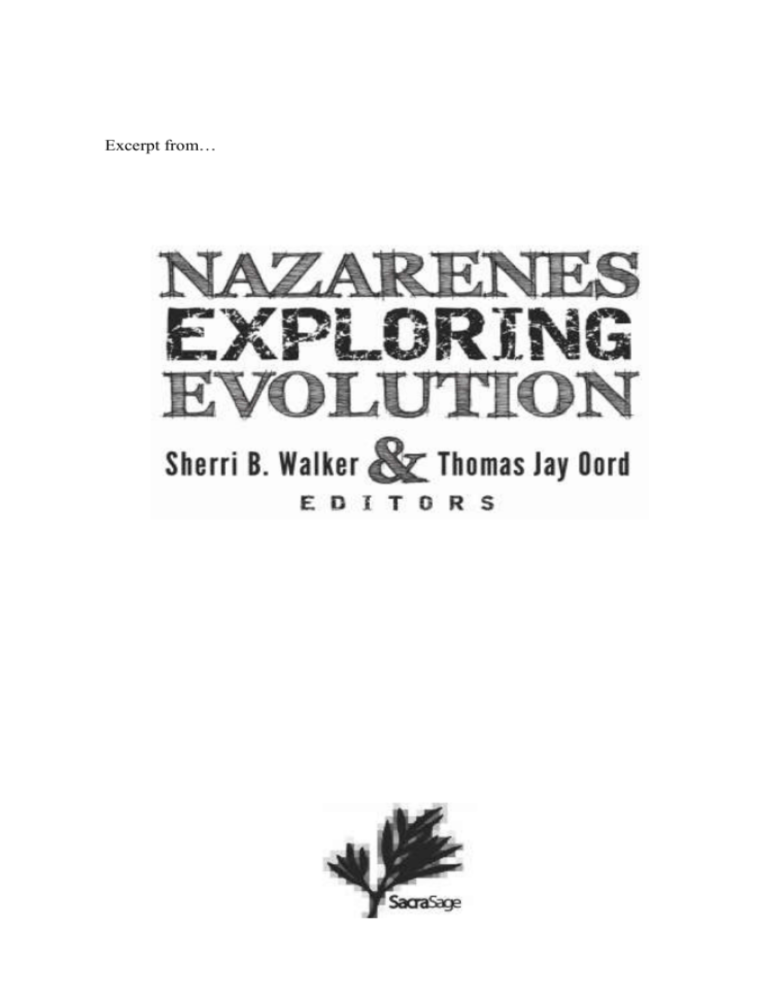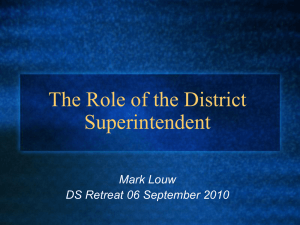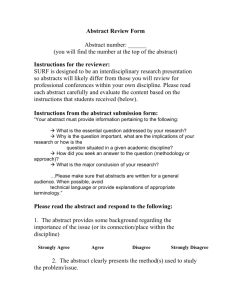
Excerpt from…
Copyright 2014 by SacraSage Press. All rights reserved. Except for
brief quotations, no part of this book may be reproduced without
prior written permission from the editors. Email Thomas Jay Oord
– tjoord@nnu.edu – for permission.
Many of these essays were originally published online at
exploringevolution.com
Published in Boise, Idaho by Russell Media
ISBN: 978-1-937498-41-2
Cover design: Jay Akkerman
Cover image: Thomas Jay Oord
Interior design: Sherri B. Walker
Library of Congress Cataloging-in-Publication
Data Walker, Sherri B. and Oord, Thomas Jay
Nazarenes Exploring Evolution
ISBN: 978-1-937498-41-2
THOMAS
INTRODUCTION
JAY OORD
INTRODUCTION
Thomas Jay Oord
Few issues are more important than how God created the universe.
And few are more contentious!
Virtually all Christians agree that God is Creator. And virtually all
believe the biblical witness to God’s creative activity. But how God acts as
Creator is disputed. And Christians disagree with one another on how to
best interpret the Bible’s statements about creation.
In 2013 and 2014, a group of leaders in the Church of the Nazarene
undertook a project to explore the possibility that God creates through
evolution. The project shares the title of this book: Nazarenes Exploring
Evolution. In a loving, constructive, and humble endeavor, the project
tried to help the Church of the Nazarene consider how evolution can complement rather than contradict Wesleyan-holiness theology.
The project was conceived and led by Thomas Jay Oord, professor of theology at Northwest Nazarene University. Sherri Walker served as
his assistant in the project. Project leadership also included Robert Branson, Jennifer Chase, T. Scott Daniels, Kerry Fulcher, Philip Hamner, Mark
Mann, and Mark Winslow. A conference with the project name was hosted
by Point Loma Nazarene University in January of 2014, with Mann and
Oord serving as conference directors.
The Nazarenes Exploring Evolution project worked to foster greater understanding among members of the Church of the Nazarene about
the potential fruitful relation between Wesleyan-holiness theology and
evolution. Its goal was not to ridicule those who hold non-evolutionary
views of creation, such as Young Earth Creationism, Progressive Creationism, or some versions of Intelligent Design. Instead, it offered Theistic Evo-
THOMAS
INTRODUCTION
JAY OORD
lution or Evolutionary Creation to the denomination as a viable alternative
among accounts of how God creates the universe.
NAZARENE SCIENTISTS ON GOD CREATING
THROUGH EVOLUTION
In a 2009 Pew research study, 97% of scientists said humans and
other living things have evolved over time by natural processes, guided by
God, or evolved in some other way.1 Prior to the Nazarenes Exploring Evolution project, no polls had been taken to find out how scientists in Church
of the Nazarene colleges and universities think about evolution. But some
scientists in the denomination had previously published their views on the
subject.
Karl Giberson, long-time professor at Eastern Nazarene College,
had affirmed evolution in a variety of books and publications. In one book,
he writes, “I think evolution is true. The process, as I reflect on it, is an
expression of God’s creativity, although in a way that is not captured by the
scientific view of the world… God’s creative activity must not be confined
to a six-day period - ‘in the beginning’ - or the occasional intervention
along the evolutionary path. God’s role in creation must be more universal – so universal it cannot be circumscribed by the contours of individual
phenomena or events.”2
Darrel Falk, professor at Point Loma Nazarene University, had
written in one of his books on the subject that “for the past century and a
half, thousands of scientists from disciplines as diverse as physics, geology,
astronomy, and biology have amassed a tremendous mass of data, and the
answer is absolutely clear and equally certain. The earth is not young, and
the life forms did not appear in six twenty-four-hour days. God created
gradually.”3
Rick Colling, a long time scientist at Olivet Nazarene University,
had said that “some people, on religious grounds, choose to aggressively ignore or deny many scientific concepts and principles, especially in the domain of evolution… The problem, as I see it, is that we tend to squeeze God
into small rigid boxes… Unfortunately, this approach to religious faith is
THOMAS
INTRODUCTION
JAY OORD
fraught with liability because it prevents God from truly being God – a
creator capable of using any means He chooses for His creation.”4
Fred Cawthorne, professor at Trevecca Nazarene University, argued that “evolution by no means contradicts the fact that God is the Maker of heaven and earth and that he has been actively guiding and sustaining
the universe for all time. If we say God cannot create through a gradual,
progressive process such as evolution, then we limit God’s transcendence
and immanence.”5
Before the Nazarenes Exploring Evolution project polling, it was
difficult to know if these views represent the majority of Nazarene scientists. But the polling results to be offered shortly confirm most Nazarene
scientists believe the evidence for evolution is strong and evolution does
not necessarily conflict with the belief God is Creator.
NAZARENE BIBLICAL AND THEOLOGICAL
SCHOLARS ON GOD CREATING THROUGH
EVOLUTION
There is little doubt some people reject evolution based on their
interpretation of the Bible. The Bible says little to nothing about evolution.
And the first chapters of Genesis, when read literally, do not easily fit the
theory of evolution.
Many biblical scholars, theologians, and philosophers in the
Church of the Nazarene, however, believe the Bible should not be interpreted as a straightforward science or history book. For instance, many
believe Genesis 1 reads like a hymn of praise. Others believe it draws from
Jewish Temple literature, which is religious and not scientific. Most Nazarene theology, Bible, and philosophy scholars believe the main point of
Genesis and other creation texts is theological: God is Creator. Genesis and
other books of the Bible need not mention the specific ways God creates
for this main point to be true.
Like several Nazarene scientists, some religion scholars in the
Church of the Nazarene had published their views on science, evolution,
THOMAS
INTRODUCTION
JAY OORD
theology and the Bible. For instance, Robert Branson, a long-time professor at Olivet Nazarene University, said that “it is one thing to say we believe
that God is the Creator. It is quite another to say that in Scripture God
described with scientific accuracy ‘when’ and ‘how’ he created.”6
Alex Varughese, professor of Mount Vernon Nazarene University, and his Nazarene co-writers of Discovering the Bible say that a “careful
reading of Genesis 1:1-2:4a shows that the focus of the text is on the Creator and what He made. Our usual questions of why, how, and when are
not answered in this account.”7
Dennis Bratcher, a long time Bible scholar in the Church of the
Nazarene and manager of an important ministry website, said that “sometimes it is hard for us to realize that the Bible, particularly the Old Testament, is an Oriental book… The thought world of Oriental culture is
radically different from the thought world of Western culture, particularly
when we recall that there is a period of three thousand years between us
and that culture… That’s why they are not writing about evolution in Genesis 1; that’s 3,000 years in their future.”8
Michael Lodahl, profess or theology at Point Loma Nazarene University, has published several items on issues of creation. In his book, God
of Nature and of Grace, Lodahl said that “a Wesleyan reading of Genesis –
and of the world – need not and should not shy away from the dominant
ideas of the contemporary natural sciences. It is obvious that if the evolutionary story of the universe (including our own planet and all of its living
inhabitants) is generally accurate, then the opening chapters of Genesis
cannot be assumed to be giving a straightforwardly literal account of the
creation of the world.”9
Thomas Jay Oord, of Northwest Nazarene University, has also
published significant writing on the subjects of evolution and creation. He
says that “the Bible tells us how to live abundant life. It does not tell us scientific details about how life became abundant. The Bible also tells us how
to go to heaven. It does not provide the science to tell us how the heavens
go.”10
THOMAS
INTRODUCTION
JAY OORD
The Nazarenes Exploring Evolution poll of religion scholars reveals that the ideas expressed in the quotations above represent well the
majority of biblical scholars, theologians, and philosophers in the denomination. Most scholars in Bible, theology, and philosophy seem at least open
to the possibility that Wesleyan-holiness theology is compatible with evolution. And many are convinced the two are compatible.
THE DIVIDE BETWEEN SCHOLARS
AND THE PUBLIC
The 2009 Pew Research poll revealed that the majority of scientists
in the United States believe in evolution. In fact, more than 9 of 10 professional scientists believe the evidence for evolution is compelling..11 While
the theory of evolution comes in a variety of forms, virtually all forms say
that gradual changes occurred to produce new species over long periods of
time.
Not only do the majority of scientists affirm evolution, the general features of evolutionary theory – including an old earth and natural
selection – are widely accepted in American culture today and in societies
around the world. Most public television and scientifically-oriented programs simply assume the general truth of evolutionary theory.
That same Pew research also shows, however, that more than half
of white American Evangelicals believe humans and other living things
have existed in their present form since the beginning of time.12 Those who
hold this view typically believe the world is relatively young. And they interpret Genesis (and other books of the Bible) in a particular way to support their young earth view.
This difference between 1) many Evangelicals and 2) the vast majority of American scientists represents the difference between most laity
and most scholars in the Church of the Nazarene. Many denominational
scholars in various disciplines – scientific, biblical, and theological – believe the general theory of evolution is compatible with Wesleyan-holiness
theology. Yet, many non-specialists in the Church of the Nazarene reject
evolution. Dan Boone, president of Trevecca Nazarene University, sums it
THOMAS
INTRODUCTION
JAY OORD
up: “The bulk of our Christian scholars/scientists are in a camp different
from the bulk of our laity [on issues of evolution].”13
TWO POLLS ON NAZARENE VIEWS
One particularly interesting aspect of the Nazarenes Exploring
Evolution project was the polls it conducted. One poll with a set of questions was placed on the project website. Anyone who visited the site was
welcome to answer the questions in the poll. While both members of the
denomination and nonmembers participated, the results below show the
response of the 285 who reported being members of the Church of the
Nazarene. Here are the results of that public poll:
Question 1:
The Bible can properly
be interpreted as compatible with the theory
of biological evolution.
120
37.89%
100
80
25.26%
21.75%
60
40
10.53%
20
0
Question 2:
Genesis
and
other
biblical texts require
Christians to believe the
earth was created less
than 15 thousand years
ago.
4.56%
Strongly
Agree
Agree
Unsure/
Don’t
Know
Disagree
Strongly
Disagree
200
55.09%
150
100
18.95%
50
0
14.39%
7.37%
Strongly
Agree
Agree
4.21%
Unsure/
Don’t
Know
Disagree
Strongly
Disagree
THOMAS
INTRODUCTION
JAY OORD
120
Question 3:
100
Geology, astronomy, and
80
physics have established
that the world is billions of 60
40
years old.
35.44%
22.11%
19.65%
12.98%
9.82%
20
0
Strongly
Agree
Agree
Unsure/
Don’t
Know
Disagree
100
Question 4:
Humans likely became a
species as God worked
with
the
biological
evolutionary process.
80
Strongly
Disagree
31.23%
27.72%
60
16.49%
17.19%
40
7.37%
20
0
Question 5:
150
The Church of the Nazarene should allow the 120
theory that God creates 90
through evolution as one
acceptable view of creation 60
among others.
30
Strongly
Agree
Agree
Unsure/
Don’t
Know
Disagree
Strongly
Disagree
43.51%
26.32%
19.30%
7.37%
3.51%
0
Strongly
Agree
Agree
Unsure/
Don’t
Know
Disagree
Strongly
Disagree
Much could be said about these polling results from the public
survey. The only known poll of Church of the Nazarene member views on
THOMAS
INTRODUCTION
JAY OORD
evolution prior to this was in 2007 and conducted by the Pew Research
institute. In that poll, only 21% of Nazarenes questioned “mostly agreed”
or “completely agreed” that evolution is the best explanation for the origins of human life on earth.” 14 Among other things, the public Nazarenes
Exploring Evolution poll suggests more Nazarenes today feel comfortable
with the idea human themselves are a part of the evolutionary process.
POLLS OF NAZARENE SCHOLARS
The second poll conducted by the Nazarenes Exploring Evolution
project was not open to the public. Instead, private invitations were sent to
scholars in science and in religion who teach in Church of the Nazarene
educational institutions in the United States. All of the major American
universities and colleges of the Church of the Nazarene were contacted,
including Nazarene Theological Seminary and Nazarene Bible College.
Here are the results of this invitation-only poll of scholars working in the U.S. Church of the Nazarene educational institutions. A total of
81 professors participated in this poll: 39 were from the sciences, 42 were
from Christian ministry departments.
Question 1:
Genesis and other biblical texts require Christtians to believe the earth
was created less than 15
thousand years ago.
80
70
81.48%
60
50
40
30
20
13.58%
10
0
0.00%
1.23%
3.70%
Strongly
Agree
Agree
Unsure/
Don’t
Know
Disagree
Strongly
Disagree
THOMAS
INTRODUCTION
JAY OORD
Question 2:
40
The Bible can properly be 35
interpreted as compatible 30
with the theory of biologi- 25
20
cal evolution.
49.38%
33.33%
15
10
7.41%
3.70%
5
0
40
Question 3:
35
Wesleyan-holiness theolo- 30
gy can be reconciled with 25
the theory of biological 20
evolution.
15
Strongly
Agree
Agree
Unsure/
Don’t
Know
37.04%
8.64%
5
40
Question 4:
35
References to Adam in the
30
New Testament are com- 25
patible with the idea the 20
earth is old.
15
Strongly
Disagree
49.38%
10
0
Disagree
6.17%
2.47%
Strongly
Agree
Agree
Unsure/
Don’t
Know
Disagree
2.47%
Strongly
Disagree
49.38%
30.86%
12.35%
10
3.70%
5
0
Strongly
Agree
Agree
Unsure/
Don’t
Know
Disagree
3.70%
Strongly
Disagree
THOMAS
INTRODUCTION
JAY OORD
80
Question 5:
God is creator.
92.59%
70
60
50
40
30
20
6.17%
10
0
60
Question 6:
Scientific evidence supports the general theory
of biological evolution.
Strongly
Agree
Agree
1.23%
0.00%
0.00%
Unsure/
Don’t
Know
Disagree
Strongly
Disagree
65.43%
50
40
30
20
19.75%
10
0
35
Question 7:
30
Humans likely became a 25
species as God worked 20
with the evolutionary 15
process.
8.64%
Strongly
Agree
Agree
Unsure/
Don’t
Know
3.70%
2.74%
Disagree
Strongly
Disagree
39.51%
27.16%
18.52%
10
7.41%
7.41%
5
0
Strongly
Agree
Agree
Unsure/
Don’t
Know
Disagree
Strongly
Disagree
THOMAS
INTRODUCTION
JAY OORD
60
Question 8:
The universe is billions of
years old.
66.67%
50
40
30
20
17.28%
13.58%
10
0
25
2.47%
0.00%
Strongly
Agree
27.16%
Agree
Unsure/
Don’t
Know
Disagree
Strongly
Disagree
25.93%
20
Question 9:
Some species and or- 15
ganisms show evidence
10
of design.
23.46%
11.11%
5
0
Strongly
Agree
60
Agree
Unsure/
Don’t
Know
12.35%
Disagree
Strongly
Disagree
66.67%
50
Question 10:
Geology, astronomy, and 40
physics have established 30
that the world is billions 20
of years old.
10
0
19.75%
8.64%
Strongly
Agree
Agree
Unsure/
Don’t
Know
3.70%
1.23%
Disagree
Strongly
Disagree
THOMAS
INTRODUCTION
JAY OORD
60
69.14%
Question 11:
50
The Church of the Naz40
arene should allow the
theory that God creates 30
through evolution as one 20
acceptable view of creat- 10
ing among others.
0
18.52%
7.41%
Strongly
Agree
Agree
Unsure/
Don’t
Know
3.70%
Disagree
1.23%
Strongly
Disagree
This set of results from scholarly views and the online results from
the public polls confirms Dan Boone’s statement that we find in the Church
of the Nazarene a marked difference between how laity and scholars think
about evolution. One goal of the Nazarenes Exploring Evolution project
was to address this divide and to argue that how we think about evolution
makes a difference.
DOES IT MATTER?
Even those mildly interested in questions of theology and evolution know the science-and-religion discussion has a history of conflict.
Any progress toward insight or reconciliation comes slowly, if at all. Veterans of the discussion are prone to weariness, and denominational leaders
might wonder if the “fight” is worth the trouble. Does addressing the issues
of evolution really matter?
Christians have long believed that truth matters. Although Christians may not ever know all truth because we “see through a dark glass” (1
Cor. 13), we are called to search for truth in our attempts to love God with
our minds. Because the natural and social sciences are primary avenues for
discovering truth about existence, these sciences can play a central role in
helping Christians discern how to love God and others as oneself.
Al Truesdale, long-time professor at Nazarene Theological Seminary, summarizes the importance of seeking truth in the Church of the
Nazarene: “Denominations that stand in the Wesleyan tradition [such as
THOMAS
INTRODUCTION
JAY OORD
the Church of the Nazarene] are at their best when they advocate a vital
faith that seeks understanding through a bold examination of the results of
all human exploration, whether in technology, in the sciences, or through
historical research.”15
One reason this discussion matters, therefore, is that the search for
more adequate understandings of God and the world God creates relies
upon a variety of sources, not the least of which are the sciences. If evolution is widely accepted among those who have studied the natural world
most intently – scientists – it matters how Christians engage the science of
evolution in light of Christian Faith.
This brings us to a second reason why the discussion of evolution
and theology matters. It matters because many (but not all) scientists in
the Church of the Nazarene affirm the general theory of evolution. These
scientists often feel ostracized, get labeled as ungodly, are marginalized, or
considered deceived.
The testimony of Nazarene biologist, Darrel Falk, is similar to the
testimonies of many Nazarene scientists: “One of the biggest deterrents (to
entering a Nazarene community) was my impression that I could never become part of an evangelical fellowship because of my belief in gradual creation…. Unless the church begins to downplay the significance of believing in some variety of sudden creation, there will continue to be thousands
of individuals … who will be denied true fellowship in God’s kingdom.”16
CHRISTIAN WITNESS TODAY
A third important reason why the evolution and Christian theology discussion matters is the nature of Christian witness. And the Christian
witness pertaining to evolution is especially true for how young people
think of God and Christian faith.
In a recent Pew study, more 18- to 29-year olds reported having a
positive view of science than those in any other age category. More specifically, sixty-one percent of young people believe life evolved over time due
to either natural process or divine guidance. Seventy percent of all college
THOMAS
INTRODUCTION
JAY OORD
graduates – no matter their age – affirm some form of evolution. In sum,
young people and those with degrees in higher education are more likely
to trust scientists who argue for the validity of evolution.
Statistics also show, unfortunately, that young people leave the
church and/or become atheists because they perceive the church to be opposed to science in general and evolution in specific. In his book, You Lost
Me: Why Young Christians are Leaving the Church and Rethinking Faith,
David Kinnaman uses the data from Barna Group research to show why
18- to 29-year olds are leaving the Church. Nearly 3 in 10 say the church
is out of step with science, and one quarter say Christianity is anti-science.
About one quarter of young people are turned off by the creation vs. evolution debate, and about one-fifth say Christianity is anti-intellectual.17
Kinnaman quotes one young person and why he left faith over the
church’s failure to accept science: “To be honest, I think that learning about
science was the straw that broke the camel’s back,” says the young person.
“I knew from church that I couldn’t believe in both science and God, so
that was it. I didn’t believe in God anymore.”18
Stories from Nazarene parents, youth pastors, and university professors indicate that some young people are leaving the Church of the Nazarene for the reasons Kinnaman reports. These young people think they
cannot affirm the idea that God creates through evolution and still feel
welcome in the denomination.
Dan Boone, president of Trevecca Nazarene University, asks an important question of himself that also applies to the Church of the Nazarene,
“Will I engage a young generation in an open-minded biblical conversation that welcomes scientific discovery, reasoned philosophy, and careful
logic? Or will I ignore all of these in favor of an interpretation of creation
that is barely one hundred years old and rooted in the fear of science?”19
THIS BOOK
At the heart of the Nazarenes Exploring Evolution project were
more than 50 essays from Nazarenes on issues of evolution. These 1,000-
THOMAS
INTRODUCTION
JAY OORD
word essays were published weekly in 2013 on the project website: exploringevolution.com. Essayists were invited to explore whatever dimension or issue in evolution they wanted. They were also encouraged to speak
from their hearts and to tell their stories, whenever appropriate.
This book offers in print most of the essays offered online in 2013.
Some of the essays are identical to their online versions; others have been
expanded significantly by their authors for this book. The editors have organized the essays to foster continuity among the diverse ideas.
This book provides a powerful testimony in itself to the compatibility most
essayists believe exists between the general theory of evolution and Christian faith.
The editors are grateful to many people for their support and encouragement. We especially appreciate the BioLogos Foundation for graciously supporting the project with a grant. In addition to thanking all who
wrote essays for this book and/or for the website, we thank the following:
Jay Akkerman, Kathryn Applegate, Dan Boone, Clayton Borah and 6foot4,
Robert Branson, Jennifer Chase, Ken Crow, T. Scott Daniels, Darrel Falk,
Kerry Fulcher, Karl Giberson, Deborah Haarsma, Ryan Hanson, Lydia
Heberling, Rich Houseal, Mark Maddix, Mark Mann, Jesse Middendorf,
Northwest Nazarene University, Point Loma Nazarene University, Mark
Russell, Al Truesdale, Burton Webb, and Donald Yerxa.
ENDNOTES AND SUGGESTED READING
1 Research Center for the People & the Press. http://www.pewforum.org/science-and-bioethics/public-opinion-on-religion-and-science-in-the-united-states.aspx Accessed
1/18/13. See also, http://www.people-press.org/2009/07/09/section-5-evolution-climatechange-and-other-issues/ Accessed 1/22/13
2 Karl W. Giberson, Saving Darwin: How to be a Christian and Believe in Evolution (New
York: HarperOne, 2008), 216.
3 Darrel R. Falk, Coming to Peace with Science: Bridging the Worlds Between Faith and
Biology (Downers Grove, Ill.: Intervarsity, 2004), 214.
THOMAS
INTRODUCTION
JAY OORD
4 Richard G. Colling, Random Designer: Created from Chaos to Connect with the Creator
(Bourbonnais, Ill.: Browning, 2004), 107.
5 Fred Cawthorne, “The Harmony of Science and the Christian Faith,” in Square Peg: Why
Wesleyans Aren’t Fundamentalists, Al Truesdale, ed. (Kansas City, Mo.: Beacon Hill Press,
2012), 105.
6 Robert Branson, “The Bible, Creation, and Science,” in Square Peg: Why Wesleyans Aren’t
Fundamentalists, Al Truesdale, ed. (Kansas City, Mo.: Beacon Hill Press, 2012), 105.
7 Alex Varughese, ed. Discovering the Bible: Story and Faith of the Biblical Communities
(Kansas City, Mo.: Beacon Hill, 2006), 65.
8 Dennis Bratcher, http://www.crivoice.org/biblestudy/bbgen1.html Accessed 1/18/13
9 Michael Lodahl, God of Nature and of Grace: Reading the World in a Wesleyan Way
(Nashville, Tenn.: Kingswood, 2003), 63.
10 Thomas Jay Oord and Robert Luhn, The Best News You Will Ever Hear (Boise, Id.: Russell
Media, 2011), 25. See also Oord, Divine Grace and Emerging Creation: Wesleyan Forays in
Science and Theology of Creation (Eugene, Or.: Pickwick, 2009) and Oord, Defining Love: A
Philosophical, Scientific, and Theological Engagement (Grand Rapids, Mich.: Brazos, 2010),
ch. 4.
11 Research Center for the People & the Press. http://www.pewforum.org/2009/11/05/public-opinion-on-religion-and-science-in-the-united-states/#evolution-and-related-issues
Accessed 1/18/13. See also, http://www.people-press.org/2009/07/09/section-5-evolutionclimate-change-and-other-issues/ Accessed 1/22/13
12 Ibid.
13 Dan Boone, A Charitable Discourse: Talking about the Things that Divide Us (Kansas City,
Mo.: Beacon Hill Press, 2010), 106.
14 2007 U.S. Religious Landscape Survey, collected by Pew Forum on
Religion & Public Life. http://www.thearda.com/denoms/families/profilecompare.asp?d=1001&d=801&d=&d=&d= Accessed 9/19/2013
15 Al Truesdale, “Introduction,” in Square Peg: Why Wesleyans Aren’t Fundamentalists, Al
Truesdale, ed. (Kansas City, Mo.: Beacon Hill Press, 2012), 10.
16 Darrel R. Falk, Coming to Peace with Science, 230. For similar testimonies, see Richard G.
Colling, Random Designer, and Karl W. Giberson, Saving Darwin.
17 David Kinnaman, You Lost Me: Why Young Christians are Leaving the Church and
Rethinking Faith (Grand Rapids, Mich.: Baker, 2011), 136.
18 Ibid., 131.
19 Dan Boone, A Charitable Discourse, 102.
THOMAS
INTRODUCTION
JAY OORD








